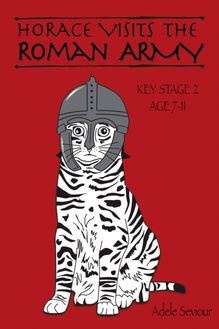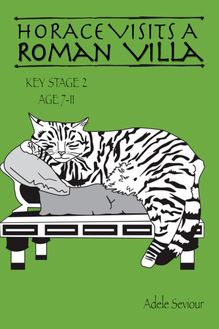-
 Univers
Univers
-
 Ebooks
Ebooks
-
 Livres audio
Livres audio
-
 Presse
Presse
-
 Podcasts
Podcasts
-
 BD
BD
-
 Documents
Documents
-
- Cours
- Révisions
- Ressources pédagogiques
- Sciences de l’éducation
- Manuels scolaires
- Langues
- Travaux de classe
- Annales de BEP
- Etudes supérieures
- Maternelle et primaire
- Fiches de lecture
- Orientation scolaire
- Méthodologie
- Corrigés de devoir
- Annales d’examens et concours
- Annales du bac
- Annales du brevet
- Rapports de stage
La lecture à portée de main
Vous pourrez modifier la taille du texte de cet ouvrage
Découvre YouScribe en t'inscrivant gratuitement
Je m'inscrisDécouvre YouScribe en t'inscrivant gratuitement
Je m'inscrisEn savoir plus
Vous pourrez modifier la taille du texte de cet ouvrage
En savoir plus

Description
Sujets
Informations
| Publié par | Andrews UK |
| Date de parution | 05 novembre 2021 |
| Nombre de lectures | 0 |
| EAN13 | 9781910824924 |
| Langue | English |
| Poids de l'ouvrage | 2 Mo |
Informations légales : prix de location à la page 0,0500€. Cette information est donnée uniquement à titre indicatif conformément à la législation en vigueur.
Extrait
HORACE VISITS THE ROMAN ARMY
KEY STAGE 2
AGE 7–11
Adele Seviour
Guinea Pig Education
2 Cobs Way
New Haw, Addlestone
Surrey
KT15 3AF
Tel: 01932 336553
Website: www.guineapigeducation.co.uk
Copyright © 2013 Guinea Pig Education
NO part of this publication may be reproduced, stored or copied for commercial purposes and profit without the prior written permission of the publishers.
Written by: Adele Seviour
Edited by: Sally and Amanda Jones
Graphic Design and Illustrations by: Annalisa Jones
2021 digital version converted and published by
Andrews UK Limited
www.andrewsuk.com
For
Rebecca, Joshua, Michelle, Kristina, Nicole, Fleur, Tyler and Harlyn
The tabby cat with his pattern of dark markings, spots or stripes on a paler background is the oldest known domestic cat, known as felis catus to the Romans. This time his magic whiskers whisk him away for a glimpse of the Roman army.
Horace lay in the sun garden wall. His tabby coat rippled like little grey and white waves on a pond. His whiskers began to twitch. They twitched faster. Was he ready for take off? He activated his i-collar. Horace was a magic cat. He was a time traveller.
Horace woke up with a start. He found himself curled up by a large flat rock. Bang! Clang! He thought, “What was that noise?” Peering round the rock with wide eyes, he saw some men dropping iron shields by the roadside. Horace had travelled back to Britain in 60 AD. They were Roman foot soldiers.
There were eight men in total (a contubernium) and they were just sitting down for some lunch of corn and beans. Horace picked up the scent. He pondered, “Were they friendly?” The smell of food was too tempting so he padded up to one of the soldiers who was sitting on his cloak. “Miaow!” he begged. “Try some of this,” said the soldier. Horace was hungry and wolfed it down in a few gulps. Delicious!
Horace looked at what the Roman soldiers were wearing. The Roman soldier was wearing a full army kit.
“ ATTENTION !” shouted the commanding officer, “put your packs on your shoulder ready to march, left, right - left, right.” The packs looked heavier than a school bag to Horace. What was in them?
There was: a tool kit a bag of nails enough food rations to last three days, including bread, cheese, beans, bacon and water a cloak that was also a blanket.
Each man also needed his own tools to build camps, forts and roads. He needed: an ax a rope a cooking pan and cup a turf cutter, a spade and a pick axe 2 pointed stakes to make camp walls a javelin, a dagger, a short sword called a galdius and his rectangular shield
“Ouch! I could not carry all of that,” said Horace to no one in particular.
Horace padded along with the legion (a band of Roman soldiers).
“Come on puss,” said the kind soldier, “march with us. We have been sent to find some clear, dry land to build a safe camp for the night, that will protect us from wild animals and surprise raids.”
It was hard for Horace to keep up, so he jumped up onto the soldier’s shoulder pack. “Left, right - left, right! Halt!” ordered the commanding officer. It was time to dig a camp. Horace scrabbled in the soil to help the soldiers build a fence with pointed stakes around the camp, where they pitched their leather tents.
Horace padded round the camp. Amazing! It was huge. Groups of eight soldiers, that were from different regiments, slept in leather tents. The tent of the commanding officer was placed in the centre. Round the outside, there were latrines (toilets), cooking ovens and rubbish pits.
Horace listened. There were some exciting sounds that sent a shiver down his spine: the talking of the Roman soldiers, the clanging of their armour, the neighing of their horses and the clash of pots and pans. As night fell, a hush fell over the camp.
People in the army: legionnaires, auxiliary soldiers and some cavalry
Now Horace consulted his i-collar to find out more about the Roman army.
“The cavalry were soldiers who rode on horses. They were the eyes of the army, riding ahead of the legions and guarding them in battle.”
“They were the highest paid Roman soldiers because they had to buy their own horses and equip them.”
“The horse’s saddle had two tall panels that gave the rider a secure seat but the harness was the same as we have today.”
“The reigns were made of leather and linked to a bit that went into the horse’s mouth.”
“The riders had spurs attached to their shoes because stirrups hadn’t been invented.”
Next morning, Horace woke to cries of horror. The soldiers had received some news. The Celts were forming an army to support the Iceni tribe; they were in revolt and preparing to fight. In the misty morning, the Roman soldiers were getting ready to march. The commanding officer shouted out a command, “Load the wagons, put in the tents and the camp kitchen. Prepare the giant catapults, (called ballistas), which fire the heavy bolts and stones at our enemy.”
Why were the British going to fight the Romans? Horace activated his i-collar. It said,
i-collar fact “Boudicca of the Iceni tribe was very angry that her husband, King Prasutagus, was dead. She was furious because he had helped the Romans, on the condition that they would look after his family, but now some soldiers from Colchester (Camulodunum) had whipped the queen and her daughters and stolen their land and treasure.”
HORACE KNEW THIS MEANT BIG TROUBLE .
Horace accompanied them, riding in the soldier’s pack. He felt proud to have joined them as an auxiliary (a foreigner serving in the Roman army) and he followed behind the Roman Governor, Suetonius Paulinus, who was up ahead with the cavalry. The long straight road echoed with the sound of the legions’ marching feet.
Horace bounced up and down in the soldier’s pack. Peering through the mist, he saw hills pass by, he saw fields pass by and he saw woods on each side. The soldiers marched on down Watling Street. Horace’s head was spinning.
They stopped. One of the leaders shouted to a passer by,
“What news? Have you seen Boudicca?”
“No! but you won’t miss her.”
“What is she like?” whispered Horace to the soldier.
“She is tall, like a giant woman. Her eyes are fierce, fiendish and flash with fire. Her voice is hoarse, harsh and horrifying. She has a mane of bright red hair that hangs like rope around her hips and her torn, tatty tunic is covered by a thick cloak of wolf skin. She flies fearlessly along in her chariot, wielding an axe menacingly, screaming ‘death to all Romans!’
“Terrifying !” thought Horace, “ absolutely terrifying!”
Watling Street: name for the Roman road between London and Wroxeter.
In an instant, Horace jumped down and padded to the front of the line to hear the latest news. That ferocious human, Boudicca, had already destroyed Londinium and Verulamium. In fact, her army had slaughtered seventy thousand people! Horace’s ears twitched nervously. He couldn’t believe what he was hearing.
The Roman army marched on.
There were ten thousand soldiers on the Roman side, compared to twenty thousand Celts on Boudicca’s side.
A battle site was chosen. It was deep in the depths of the forest. What was that terrible noise? Were the Celts coming?
Horace hid under the bush; he was frightened of these terrifying Celtic tribes men with bright blue painted bodies and long, white stiff hair, who screamed out their battle cries ferociously.
Suddenly, the battle commenced; the soldiers were brave. Horace heard the war cries as the men charged, he heard the terrified neighs of the horses, he heard the crashing of the chariots as they smashed together and the banging of the swords and shields.
i-collar fact “The British army was not as well protected as the Romans. They wore cloth tunics and cloaks, bronze helmets, shields and leather belts. Their scabbards were made of wood and they carried a sword and a spear.”
-
 Univers
Univers
-
 Ebooks
Ebooks
-
 Livres audio
Livres audio
-
 Presse
Presse
-
 Podcasts
Podcasts
-
 BD
BD
-
 Documents
Documents
-
Jeunesse
-
Littérature
-
Ressources professionnelles
-
Santé et bien-être
-
Savoirs
-
Education
-
Loisirs et hobbies
-
Art, musique et cinéma
-
Actualité et débat de société
-
Jeunesse
-
Littérature
-
Ressources professionnelles
-
Santé et bien-être
-
Savoirs
-
Education
-
Loisirs et hobbies
-
Art, musique et cinéma
-
Actualité et débat de société
-
Actualités
-
Lifestyle
-
Presse jeunesse
-
Presse professionnelle
-
Pratique
-
Presse sportive
-
Presse internationale
-
Culture & Médias
-
Action et Aventures
-
Science-fiction et Fantasy
-
Société
-
Jeunesse
-
Littérature
-
Ressources professionnelles
-
Santé et bien-être
-
Savoirs
-
Education
-
Loisirs et hobbies
-
Art, musique et cinéma
-
Actualité et débat de société
- Cours
- Révisions
- Ressources pédagogiques
- Sciences de l’éducation
- Manuels scolaires
- Langues
- Travaux de classe
- Annales de BEP
- Etudes supérieures
- Maternelle et primaire
- Fiches de lecture
- Orientation scolaire
- Méthodologie
- Corrigés de devoir
- Annales d’examens et concours
- Annales du bac
- Annales du brevet
- Rapports de stage








